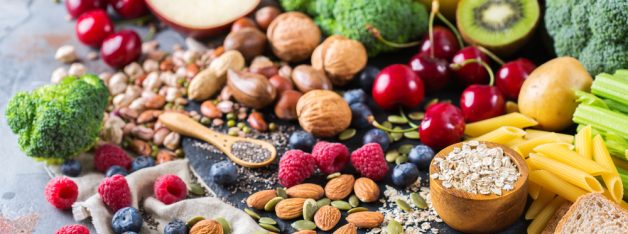Treating Acne with Diet and Food
The Role of Inflammation in Acne
The inflammation response plays a central role in the development in acne. Inflammation irritates the skin, causing you to touch it and to introduce bacteria and to cause them to get deeper into the skin. As discussed in our other article bacteria are one of the main causes of acne. Once bacteria get established in a clogged pore the surrounding tissue gets inflamed and swells up because of the immune response which further clogs pores.
One thing dermatologists can do for acne that needs to go away quickly is to inject it with with inflammation suppressing steroids that blunt and reduce the immune response. You can also reduce inflammation by making the following changes to your diet.
Treat Acne with Omega-3 Oils
There are many good food sources of omega-3 oils such as flaxseed, chia seeds, and fish. We recommend taking a fish oil supplement because it has the Essential Fatty Acids DHA and EFA. These are a special kind of omega-3 that have many benefits like supporting neural development in addition to its inflammation lowering effects. Studies have shown that omega-3 fish oil supplementation is useful in improving acne severity and reducing lesion count.
Treat Acne by Increasing Antioxidant Consumption
Inflammation is a complex chain of events involving chemical messengers and free radicals. Antioxidants are compounds that neutralize free radicals. Antioxidant foods like green tea, ginger, turmeric, tomatoes, blueberries, raspberries, and leafy green vegetables are usually brightly colored and have potent anti-inflammatory effects.
Treating Acne with Probiotics
Probiotics are symbiotic or commensal microorganisms that can provide benefits to the host organism. These microbes live on your skin as well as your gut. One study noted that Staphylococcus epidermis on skin is able to inhibit the growth of acne-causing C. acnes.
The role of probiotics taken orally shows promise in the treatment of acne. Taking probiotics reduces skin inflammation and has benefits for certain diseases like eczema. Probiotics have been observed to increase glucagon-like peptide-2 production, improve gut permeability (which is a sign of lower inflammation in the gut), and decrease proinflammatory cytokines.
Diet and Acne
Based on our understanding of the root causes of acne the goals of treating acne through dietary changes are
- reducing inflammation.
- decreasing glycemic load to minimize spikes in insulin and acne-causing IGF-1
The following changes to your diet can help you minimize acne caused by diet
Dairy Causes Acne – Avoid
Dairy products have a high glycemic index which causes increases your IGF-1 levels which can contribute to the development of acne. Dairy itself also contains IGF-1 which can be absorbed through the colon. Dairy can either be in the form of milk, milk products, cheese, or whey protein shakes.
Chocolate Causes Acne – Avoid
Chocolate is rich in dairy and inflammation causing unsaturated fats. There are many changes that you can make to your diet to ensure that you have low levels of inflammation and clear skin.
Processed Foods Cause Acne – Avoid
Processed foods are foods that have been processed to the point where much of the beneficial fiber and nutrients are no longer there. Processing of foods makes them easier to digest and absorb and cause greater insulin spikes. Avoid sugary drinks and refined carbohydrates to minimize the amount of IGF-1 produced by the body and acne.
Zinc Deficiency Contributes to Acne
Several studies have noticed correlations between low zinc levels and acne. One study compared the efficacy of zinc supplementation to the oral antibiotic and anti-inflammatory drug minoxicycline. It found that both are effective but minoxycycline was 17% more effective. A 1989 study found that 30mg of zinc daily created a statistically significant improvement in inflammatory acne. Another study compared zinc with tetracyclines and found similar improvements in both the group treated with tetracyclines and the group treated with acne.






